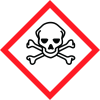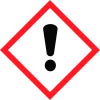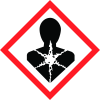Chloroform-D1 deuteration degree min
Merck KGaA
Revision date : 2021-07-01



General Information
Revision date
2021-07-01
Product name
Chloroform-D1 deuteration degree min
CAS No.
865-49-6
REACH No
01-2120242098-57-XXXX
Emergency telephone
+(44)-870-8200418 (CHEMTREC (GB
Icons in SDS
Company Information
Company name
Merck KGaA
E-mail address of the competent person responsible for the Safety Data Sheet
TechnicalService@merckgroup.com
GHS Information
Signal word
Danger
Hazard Codes
Hazard statements (CLP)
H302, H315, H319, H331, H336, H351, H361d, H372
Hazard statements
Code
Statements
H302
Harmful if swallowed
H315
Causes skin irritation
H319
Causes serious eye irritation
H331
Toxic if inhaled
H336
May cause drowsiness or dizziness
H351
Suspected of causing cancer
H361d
Suspected of damaging the unborn child
H372
Causes damage to organs through prolonged or repeated exposure
Precautionary statements
Code
Statements
P202
Do not handle until all safety precautions have been read and understood.
P301+P312
IF SWALLOWED: call a POISON CENTER/doctor/... IF you feel unwell.
P302+P352
IF ON SKIN: wash with plenty of water.
P305+P351+P338
IF IN EYES: Rinse cautiously with water for several minutes. Remove contact lenses if present and easy to do - continue rinsing.
P308+P313
IF exposed or concerned: Get medical advice/attention.
Section 2
CLP CLASSIFICATION
Acute toxicity, Oral (Category 4), H302 Acute toxicity, Inhalation (Category 3), H331 Skin irritation (Category 2), H315 Eye irritation (Category 2), H319 Carcinogenicity (Category 2), H351 Reproductive toxicity (Category 2), H361d Specific target organ toxicity - single exposure (Category 3), Central nervous system, H336 Specific target organ toxicity - repeated exposure, Oral (Category 1), Liver, Kidney, H372 For the full text of the H-Statements mentioned in this Section, see Section 16.
2.2 Label elements
Labelling according Regulation (EC) No 1272/2008
Signal word
Danger Danger
Hazard statements
H302 Harmful if swallowed. H315 Causes skin irritation. H319 Causes serious eye irritation. H331 Toxic if inhaled. H336 May cause drowsiness or dizziness. H351 Suspected of causing cancer. H361d Suspected of damaging the unborn child. H372 Causes damage to organs (Liver, Kidney) through prolonged or repeated exposure if swallowed. For use in industrial installations only. Reduced Labeling (<= 125 ml) H331 Toxic if inhaled. H351 Suspected of causing cancer. H372 Causes damage to organs through prolonged or repeated exposure if swallowed. H361d Suspected of damaging the unborn child.
Precautionary statements
P202 Do not handle until all safety precautions have been read and understood. P301 + P312 IF SWALLOWED: Call a POISON CENTER/ doctor if you feel unwell. P302 + P352 IF ON SKIN: Wash with plenty of water. P304 + P340 + P311 IF INHALED: Remove person to fresh air and keep comfortable for breathing. Call a POISON CENTER/ doctor. P305 + P351 + P338 IF IN EYES: Rinse cautiously with water for several minutes. Remove contact lenses, if present and easy to do. Continue rinsing. P308 + P313 IF exposed or concerned: Get medical advice/ attention. P202 Do not handle until all safety precautions have been read and understood. P304 + P340 + P311 IF INHALED: Remove person to fresh air and keep comfortable for breathing. Call a POISON CENTER/ doctor. P308 + P313 IF exposed or concerned: Get medical advice/ attention.
Supplemental label elements
none none
2.3 Other hazards
This substance/mixture contains no components considered to be either persistent, bioaccumulative and toxic (PBT), or very persistent and very bioaccumulative (vPvB) at levels of 0.1% or higher.

